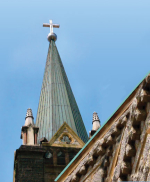 |
One of the twin spires of St. George's before the church was razed earlier this year
Photo by David Perez |
Contributing editor Melinda R. Heppe writes about how our transient work as humans fit into the everlasting work of God.
In the morning, my son sometimes greets me with "Hey, Big Mama." Not for long. In a couple of years he will be taller than I am. For now, he takes comfort in my comparative bulk. I remember doing the same, but not for long. My mother died young, and I recently realized — and was disconcerted by the realization — that I have lived on this earth longer than she did.
And then there is St. George's.
That glorious gray pile on the corner, the focal point of my town's skyline for a century, the comfort of that sheer bulk, those twin spires, that copper roof — it is no more. The bulldozers are flattening the lot as I type.
It has been a slow season of extravagant grief.
Hope did not die quickly. Even as the towers came down, our local candidate for sainthood was feverishly petitioned. As someone explained it, "For canonization, he needs to perform a miracle. We need a miracle to save St. George's. It's win/win, right?" A rumor circulated that a worker walked off the job after seeing the face of Jesus in the exposed brickwork.
As bulldozers ripped into the body of the church on a cold, windy day, I stood with an old fella on Main Street. He turned to me with tears in his eyes and said, "The town is doomed for this." Not long afterward, a worker was killed when a recalcitrant piece of masonry suddenly gave way.
Around here, people tend to experience sorrow as anger, and now we have entered a season of imbalance. Day after day, I see people walking down the street and startling: they look up and around, and then they go on, realizing that while they are at Jardin and Cherry Streets, St. George's isn't.
Gradually the new reality will settle in, for better or for worse, and we do not yet know what it will be.
Once upon a time, board members from a certain school attended one of In Trust's governance seminars. They were eager learners but seemed clueless. And we were surprised, because the former president of that institution was one of the governance gurus who had helped us establish the seminars in the first place. When the former president had been in charge, the seminary's board was a thing of beauty, and — we thought — a joy forever.
But nothing lasts forever. So we asked the former president how he felt, seeing that his work seemed to have faded away. He shrugged. "My mentor once told me, ‘Put your finger in a glass of water. Now take it out. Has the water changed?'"
I've been writing poetry to deal with my own grief about St. George's, which has been my bulwark for the many years I've lived in its shadow. My son looked over the collection and said, "You can't publish these until you write a cheerful poem."
Or at least a hopeful poem, I guess. I may or may not manage that. But here is something true: We are not responsible for the future, but we still plan for it. What we do now matters. St. George's was a thing of beauty but remains a joy forever.
Just so for that once-upon-a-time board. Nothing is ever lost in God's love, and God will not leave us without the big, reassuring presence we need.